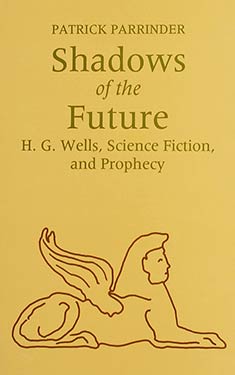
Added By: gallyangel
Last Updated: gallyangel
Shadows of the Future: H. G. Wells, Science Fiction and Prophecy
| Author: | Patrick Parrinder |
| Publisher: |
Liverpool University Press, 1995 |
| Series: | |
|
This book does not appear to be part of a series. If this is incorrect, and you know the name of the series to which it belongs, please let us know. |
|
| Book Type: | Non-Fiction |
| Genre: | Science-Fiction |
| Sub-Genre Tags: | |
| Awards: | |
| Lists: | |
| Links: |
|
| Avg Member Rating: |
|
|
|
|
Synopsis
H. G. Wells - inventor of the concept of the time machine and the phrase "the shape of things to come" - described his life's work as one of critical anticipation. This book unravels the complex layers of meaning in "The Time Machine", and shows how, throughout his life, he sought to exploit the potential of literary and cultural prophecy in new ways.
Described by John Middleton Murry as "the last prophet of bourgeois Europe", he was its first futurologist. In "Shadows of the Future", Wells's assumption of the prophet's role is related to his championing of the modern scientific outlook, and to the theory and practice of science fiction and utopian literature. Parrinder explores the connections between novelty and repetition, between imagining the future and imagining the past, and between prophecy and parody as literary modes. Wells's science fiction is reexamined both as a projection of the cosmology implicit in the writings of Darwin and Huxley, and as a new variation on the Romantic and Enlightenment themes of such earlier authors as Blake, Gibbon and Mary Shelley. Later chapters relate Wells's fiction to his nonfiction and look at the uneasy relationship of his utopianism to literary prophecy, and at the paradoxes inherent in the militant internationalism of the "prophet at large". Finally, Well's influence is traced in a study of the antiutopian fictions in Zamayatin and Orwell, and in a broad account of the connections between science fiction and the scientific outlook down to our time.
Excerpt
No excerpt currently exists for this novel.
Reviews
There are currently no reviews for this novel. Be the first to submit one! You must be logged in to submit a review in the BookTrackr section above.
Images
No alternate cover images currently exist for this novel.



















 Full Details
Full Details





